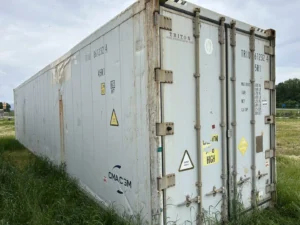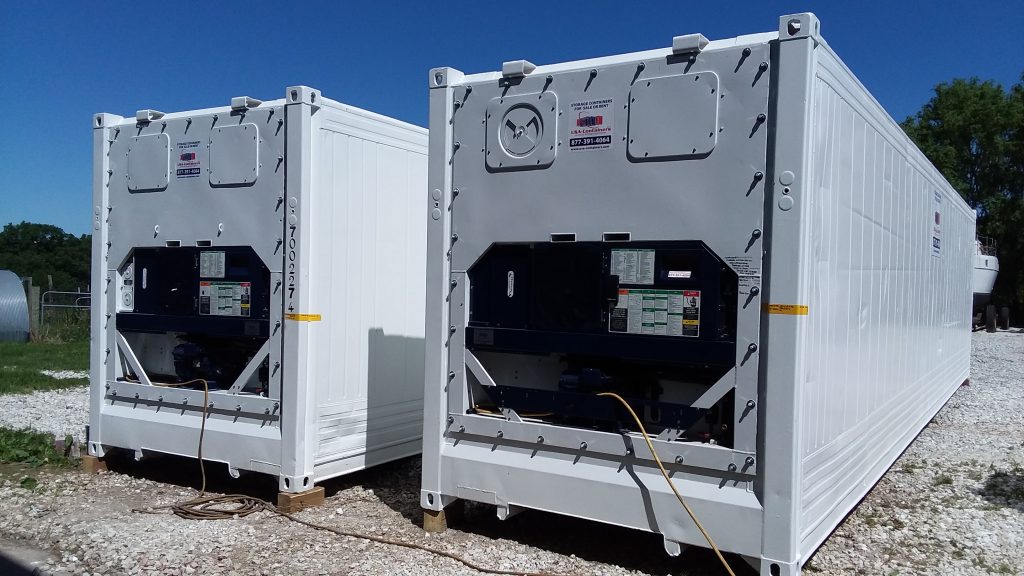Everything About Freezer Containers: Necessary Insights for Your Storage Space Demands
Freezer containers play a vital duty in the conservation of perishable goods. They can be found in various forms, including cooled and insulated systems, each developed for specific storage demands. Understanding the advantages and key attributes of these containers is necessary for companies aiming to optimize their operations. As the demand for reliable storage remedies grows, discovering the various options available can bring about informed choices that impact both earnings and sustainability. What factors should one consider when choosing the appropriate container?
Kinds Of Cold Store Containers
Cold storage space containers come in numerous kinds, each developed to fulfill specific temperature control demands. Amongst one of the most common types are refrigerated containers, which preserve temperatures in between 0 ° C to 10 ° C, making them appropriate for disposable items like fruits, veggies, and milk products. An additional type is the deep freezer container, which operates at temperatures listed below -18 ° C, suitable for long-lasting storage space of frozen items such as meats and seafood.
Insulated containers offer temperature stability without energetic cooling, making them useful for short-term transportation of temperature-sensitive items. Furthermore, there are portable chilly storage space systems, which provide adaptability in places and are commonly utilized in occasions or seasonal procedures. Lastly, blast refrigerators quickly reduce the temperature of warm foods, ensuring safety and quality. Each kind serves a special objective in numerous industries, from food solution to drugs, stressing the relevance of choosing the right container for details storage demands.

Advantages of Using Cold Store Solutions

Furthermore, cold storage services prolong the service life of products, reducing waste and boosting profitability for organizations. By effectively taking care of stock with proper temperature level control, firms can optimize their supply chains and improve functional effectiveness.
Additionally, cool storage facilities enable for adaptable storage space choices, fitting various quantity needs and seasonal variations in demand (used 40ft refrigerated shipping containers). This adaptability aids services respond swiftly to market changes
Employing cold storage space options can guarantee compliance with wellness and safety laws, guarding both businesses and consumers. Generally, the calculated use freezer boosts product monitoring while promoting sustainability and economic stability.
Key Attributes to Look for in Freezer Containers
When choosing freezer containers, a number of essential attributes benefit cautious factor to consider to safeguard peak efficiency and reliability. Temperature control capacities are necessary; containers must keep regular temperature levels appropriate for specific items. Insulation quality additionally plays a significant function, as superior insulation reduces energy usage and improves temperature level stability.
Next off, simplicity of access and loading is essential; containers must supply straightforward styles for efficient handling and organization. Longevity is one more vital facet; weather-resistant materials ensure durability and protect materials against environmental aspects.
Furthermore, movement attributes, such as built-in wheels or raising points, facilitate transportation, while customizable designs permit tailored storage solutions.
Last but not least, keeping track of systems, including temperature alarm systems and remote tracking, supply real-time updates, making particular that problems remain excellent. By concentrating on these features, users can pick cold store containers that fulfill their operational demands effectively.
Picking the Right Cold Storage Space Container for Your Requirements
Choosing the best freezer container needs a thoughtful evaluation of certain requirements and operational requirements. Aspects such as the type of items being saved, temperature level of sensitivity, and quantity ought to be focused on. Disposable food products might necessitate containers with stringent temperature level controls, while pharmaceuticals may require exact conditions to preserve efficacy.
Furthermore, potential customers ought to consider the container's dimension and flexibility. A larger system might be essential for bulk storage, while smaller, mobile choices can be optimal for temporary or on-site needs. Insulation quality and energy efficiency are likewise essential, as these will certainly influence functional expenses and temperature stability.
Finally, compliance with industry regulations and criteria is necessary, specifically in fields like food and health care. By meticulously reviewing these aspects, individuals can select a freezer container that successfully fulfills their unique needs and guarantees optimum storage space problems.
Finest Practices for Maintaining Cold Store Conditions
Keeping ideal cold store problems is essential for preserving the high quality and safety and security of temperature-sensitive products. Routinely monitoring temperature level and humidity degrees is essential; utilizing trustworthy digital thermostats and hygrometers can provide exact analyses. Furthermore, appropriate insulation of freezer containers helps minimize temperature changes and power loss.
Carrying out a first-in, first-out (FIFO) system ensures that older inventory is utilized prior check out here to newer supply, minimizing waste (used 40ft refrigerated shipping containers). Furthermore, keeping an organized format within the storage space permits far better airflow and lessens the threat of cross-contamination
Routine upkeep examine tools, such as compressors and seals, are crucial to stop malfunctions. Personnel training on ideal techniques for loading and discharging products helps maintain temperature honesty. Keeping doors shut as much as feasible restrictions warmth exchange, assuring that the cool storage space setting continues to be reliable and secure in protecting useful items.
Price Factors To Consider for Cold Storage Space Solutions
When assessing chilly storage space remedies, it is important to consider the initial financial investment prices along with ongoing operational expenditures. A detailed failure of these prices can expose significant lasting cost savings potential for businesses. Recognizing these monetary aspects helps stakeholders make informed decisions concerning their cold store requirements.

First Investment Costs
The financial landscape of cold storage containers presents various preliminary financial investment expenses that companies should think about. These costs typically include the acquisition or rental rate of the containers, which can differ based upon Going Here type, size, and insulation top quality. Additionally, expenditures associated with retrofitting existing frameworks to fit cold store needs to be factored in, especially if specialized equipment is required. Installment costs, including electric job and refrigeration systems, likewise add to the total first investment. Companies should not forget transport expenses for providing containers to their desired location. Prospective customization alternatives, such as shelving or temperature surveillance systems, can better impact the preliminary financial expense. Careful budgeting for these variables is crucial for effective cold store implementation.
Functional Expenditures Breakdown
Operational expenditures for freezer services incorporate several essential expense considerations that services have to navigate. Secret variables include power prices, which can be substantial because of the requirement to keep low temperatures. Upkeep expenses are likewise considerable, as routine maintenance is necessary to assure equipment operates successfully and continues to be certified with health and security requirements. In addition, labor expenses might occur from the need for specialized personnel to take care of and monitor the storage environment. Insurance expenses are one more factor to consider, as companies should protect their financial investments versus possible losses. Ultimately, any kind of potential regulative compliance costs should be factored in, as companies might need to purchase systems that comply with food safety and security and ecological laws. Comprehending these expenses is vital for efficient budgeting.
Long-Term Cost Savings Prospective
Investing in cold store solutions supplies significant long-lasting financial savings capacity, transforming initial expenditures right into monetary performance gradually. By lessening putridity and waste, companies can enhance their revenue margins considerably. Advanced insulation and energy-efficient systems lower utility costs, which gather over the life expectancy of the tools. Moreover, cool storage containers often require less frequent maintenance contrasted to standard refrigeration methods, bring about reduced repair service costs. The capacity to store items for extensive durations without jeopardizing quality enables organizations to utilize on market variations, enhancing revenue. Furthermore, the scalability of cool storage space remedies allows companies to adapt to transforming needs without incurring extreme expenses. In general, these variables add to a compelling instance for cold store as a cost-effective financial investment strategy.
Regularly Asked Concerns
How Much Time Can Food Be Kept in Freezer Containers?
The duration food can be stored in cool storage containers varies by kind. Usually, perishable items last from days to weeks, while frozen foods can continue to be safe for months, depending on appropriate temperature level and storage space conditions.
Are Cold Store Containers Energy-saving?
The power efficiency of freezer containers differs based on design and insulation high quality. Modern devices usually utilize advanced technology to lessen power intake, ultimately contributing to minimized functional costs and ecological impact in long-term use.
Can Freezer Containers Be Personalized for Details Requirements?
Cold storage space containers can certainly be customized to meet specific needs. Alterations might include temperature level controls, dimension modifications, and extra features, enabling individuals to tailor services efficiently for various storage space requirements and operational choices.
What Are the Usual Sizes of Cold Store Containers?
Cold store containers typically can be found in typical dimensions such as 10, 20, and 40 feet. These dimensions fit different storage needs, making certain versatility for organizations needing temperature-controlled atmospheres for perishable goods or sensitive products.
Do Cold Storage Containers Require Special Permits for Use?
Cold store containers usually need special permits for usage, depending on local laws and meant applications. Authorities might mandate licenses to guarantee security standards, environmental compliance, and proper operational techniques are preserved during their utilization.
Cold storage containers come in various types, each designed to fulfill certain temperature level control requirements. Furthermore, cold storage centers allow for flexible storage space alternatives, fitting numerous quantity needs and seasonal fluctuations in need. Picking the best cool storage space container requires a thoughtful evaluation of operational needs and specific requirements. The monetary landscape of cool storage containers presents various first investment costs that services must take into consideration. Cold storage space containers can indeed important source be customized to satisfy particular demands.